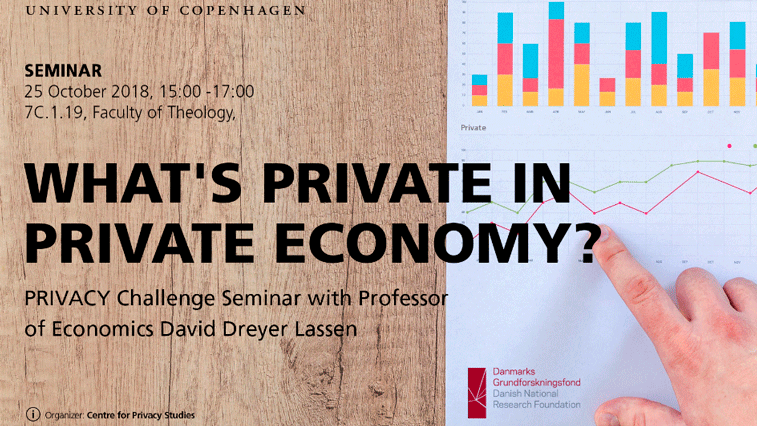Challenge Seminar: What's private in private economy?

Challenge Seminar with Professor David Dreyer Lassen.
It’s the every first challenge seminar at PRIVACY.
We have invited David Dreyer Lassen who is a professor of Economics at the University of Copenhagen. He is the founding director of the Center for Social Data Science (SODAS) and co-deputy director of the Center for Economic Behavior and Inequality (CEBI), established in 2017 through a grant from the Danish National Research Foundation.
David Dreyer will give his perspectives on Privacy through his research field in his talk:
Economics as a discipline is about analyzing trade-offs, and discussions about privacy have plenty of those. For example, internet users may make personal information available to data collectors in order to receive more relevant offers or access to services, at the potential cost of divulging personal traits that can be used for advanced price setting. While economic research into privacy as such began in the 1970s, concerns for the respect for privacy in economic life have been around at least since Adam Smith (1723 – 1790). In the seminar, I attempt to characterize the different, sometimes overlapping, roles of privacy in economics and political economics: Privacy as a right and as a (normative, cultural) constraint on policy, and privacy as a commodity, to be bought and sold. I also discuss two recent topics in economic privacy: the implications of reductions in costs of personal data collection and processing due to the increasing digitalization of society, and the protection of personal data when consumers’ decision-making capabilities are imperfect.
The talk will be follow by a debate lead by the two PRIVACY researchers Anni Haarh Henriksen and Michaël Green.
About the Challenge Seminars:
PRIVACY hosts two Challenge seminars each semester. Here, the PRIVACY’s research team join with invited experts on such topics as surveillance, privacy rights, medical ethics, work-life balance or social cohesion, to pose mutual research challenges.
